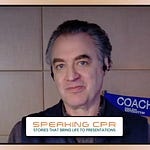Famous American author Ralph Waldo Emerson once said, “What you are doing speaks so loudly, I cannot hear what you're saying.”
In my world of high impact communication skills with business leaders and sales professionals, I've noticed that there are many people talking about the importance of storytelling.
On one hand, this is good because we need to be aware of the impact that a well-written and well-delivered story can have on audiences and in one-to-one meetings.
On the other hand, there's a big problem:
People have become accustomed to this idea and they've acknowledged the importance of telling stories so that people are out telling stories in every situation.
Why Always Telling Stories Is A Problem
Here's why this is a problem:
What if you are, for example, a financial advisor and you're talking about the importance of investing or insurance, but the people you're talking to have had bad experiences in those arenas or they have a misunderstanding or misconception about these products?
No matter how good your story is, if you don't first address those issues by having conversations or, if you're a speaker. doing some pre-work to discover what your audience's thought process is, your audiences will never hear your story.
As a corollary to Ralph Waldo Emerson's famous statement, I created this one…
The story playing in your head speaks so loudly you cannot hear what I am saying.
How To Overcome This Communication Hurdle
As leaders and sales professionals, how do we overcome this problem. In a one-to-one meeting, it's simple.
Ask questions Dig deep until you get to the the emotional core. Why do people have the beliefs they do?
Again, using the financial planner example, why do they believe what they do about investments or insurance or tax planning?
You may find they've had bad experiences. You may discover they grew up in a household that had negative beliefs about money.
There are many potentially different answers you'll get, but once you know their story, where they're coming from, you're in a better position to bridge their experience to the narrative you want them to believe.
As speakers and presenters, we have to do homework. Talk with the meeting planner, meet the people who are bringing you in and find out the challenges people in their organization are facing. What are concerns they've expressed?
You can't do as deep a dive as you would in a one-to-one meeting, but you get the idea. Once you start to understand the story that's going through their collective heads.
You’re now in a position to bridge the gap between where they are now and persuade them to accept your narrative.
But, immediately jumping into your presentation with a story, without knowing what's going on in their heads, is goin to lessen your impact. Your story and your narrative will not have the impact it could.
Do that homework. Ask those deep dive questions, and you’ll have a better chance of your story landing with every audience.
Want To Take A Deeper Dive Into High Impact Storytelling?
If you'd like to take a deeper dive into storytelling, feel free to sign up for our complimentary 52 storytelling insights. Go to this link: https://speakingcpr.com/52-storytelling-tips/
In a year's time, you will be able to triple your effectiveness. I say that because that's what happened to me when I put these into place nine years ago. They helped increase my impact, they increase my sales. They can help you too.












